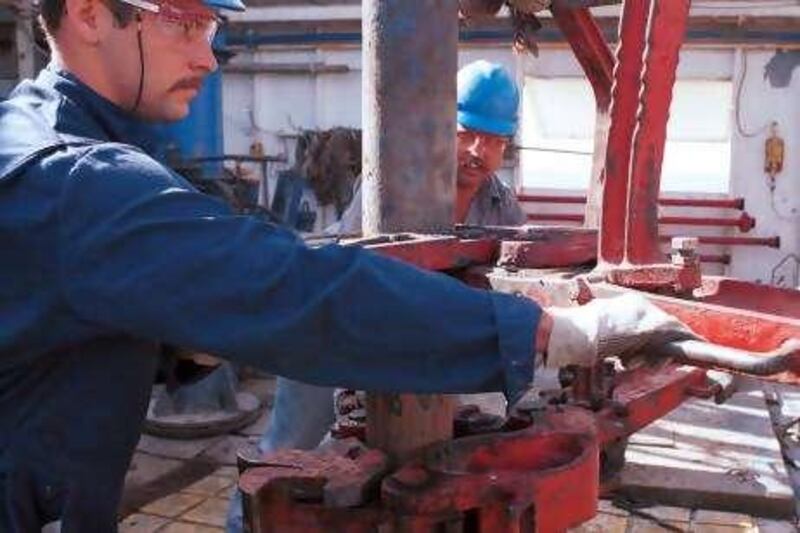BP is to sell US$7 billion (Dh25.69bn) worth of assets in the US, Canada and Egypt amid criticism over the company's handling of its immense oil spill in the Gulf of Mexico. BP said the US oil firm Apache would pay a $5bn cash deposit on July 30 as part of the deal, bolstering the funds immediately available to BP to pay costs related to the oil that has leaked for about three months into the ocean from the company's damaged deepwater Macondo well.
"We have achieved an excellent price for a set of properties that are worth more to others than to BP," said Tony Hayward, the BP chief executive, who is under pressure in the US to resign. The deals, which require various regulatory and partner approvals, go most of the way to fulfilling BP's previously announced target of raising $10bn from asset sales to pay clean-up costs and compensate individuals and businesses harmed by the spill. The company has also said it plans to sell $1.7bn of assets in Pakistan and Vietnam.
"Over the last two months, the board has considered BP's options for generating the cash necessary to meet the obligations likely to arise from the Gulf of Mexico oil spill," said Carl-Henric Svanberg, the company's chairman. "The board believes that there are opportunities to divest assets which are strategically more valuable to other parties than they are to BP. Today's announcement is the first such transaction."
BP is to receive $3.1bn for 10 mature oilfields and related gas-processing facilities in the Permian Basin of east Texas and New Mexico. The company produces 15,100 barrels per day (bpd) of oil and 80 million cubic feet per day (cfd) of gas from reserves of 126 million barrels of oil equivalent (boe) in the area. The Permian Basin has yielded more than 35 billion barrels of crude since its first commercial oil well was drilled in 1921. The US Geological Survey estimates that only 1.3 billion barrels of oil remain to be discovered, along with 41 trillion cu ft of gas.
In western Canada, BP is selling gas-producing properties in a region that is less picked-over than most US onshore oil and gas basins but is still at an advanced stage of development by global standards. The company has been withdrawing from Canada since the early 1990s, although it will retain its Canadian Arctic and oil-sands assets. Apache will pay $3.25bn for properties producing 240 million cfd of gas and 6,500 bpd of liquids from about 1.4 billion boe of reserves that are remote from major markets. Theproperties include a coal-bed methane project with the potential to produce 130 million cfd within a decade.
The Egyptian assets included in the package for $650 million are onshore exploration concessions located in desert areas west of the Nile. BP is not quitting Egypt. The British oil group and the German gas and power company RWE on Tuesday announced they had signed a $9bn deal to develop deepwater gas deposits off Egypt's Mediterranean coast. BP had previously said it would focus its spending in Egypt on its Nile Delta offshore concessions.
Apache is already active in all three of the regions in which it will acquire BP assets. Its onshore Egyptian concessions are more extensive than those of the international oil major. Last year, Apache pumped 152,600 boepd of oil and gas from Egypt, which accounted for 30 per cent of its production revenue. "This is a rare opportunity to acquire a legacy position from a major oil company," said Steven Farris, the chairman and chief executive of Apache. "We seldom have an opportunity like this in one of our core areas, let alone three. This is a step that will add muscle, enabling Apache to add value for decades to come."
Nevertheless, the US company's shares fell yesterday after it announced it would issue shares to help pay for the assets. BP's shares rose by 12.45 pence in London to close at 399.9 pence. "This is a speedy action and divests assets which are not really core to BP at an attractive price," said Peter Hutton, an analyst at NCB Stockbrokers. Meanwhile, the New York Post and The Timesin London, citing anonymous sources, said Mr Hayward was preparing to step down from his executive post within the next 10 weeks to make way for a fresh face at BP's helm. The Times named Robert Dudley, the 54-year-old chief executive of BP's restoration unit for the US Gulf Coast, as Mr Hayward's most likely successor.
Mr Dudley grew up in Mississippi, one of the US states affected by the oil spill. He is experienced with controversy, having overseen BP's Russian operations as the company ran afoul of Moscow's increasingly nationalistic energy policy. BP rejected reports of an imminent departure by Mr Hayward. "He has full support from the board and will remain in place," a BP spokesman said. @Email:tcarlisle@thenational.ae





